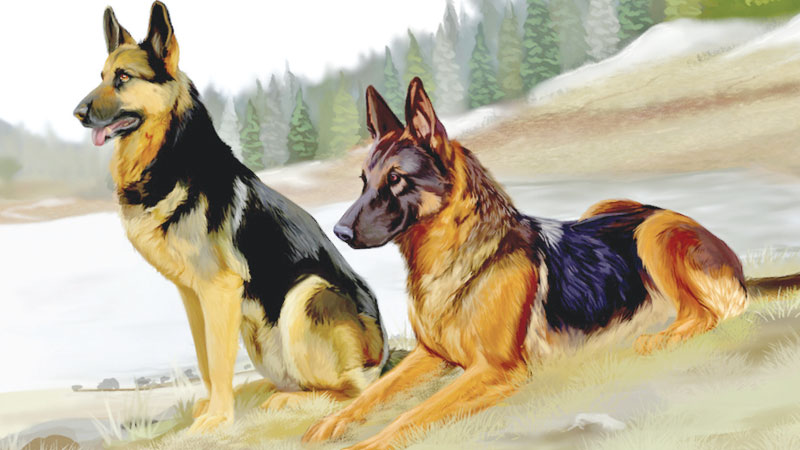My first dog arrived by sea, tired and bedraggled on his journey from Barbados to Dominica. I was a kid when the German Shepherd showed up in the garage one yellow afternoon, lying on the stone floor, exhausted from his voyage, looking for all the world like a brown-black wolf from some winter woodland. He was already medium-sized. My parents knew the man who had brought him to us, and though he was just from a few islands away, to me he seemed almost sidereal, alien, as I had never been around a large canine before. After minutes of hesitation, I tiptoed up to him with the surreptitious footfalls of a cartoon thief, but I was too afraid to touch him. I ran back inside.
Chinook, we christened him, after a Pacific-American wind. At first, he was quiet, cautious, feeling out who we were. In a few weeks, we lost our fear of each other. He became my best friend at home, the person-but-not-quite-a-person I could run around with and playfully wrestle and chase lizards with and tell tales of my existential angst to while the evening rose, with her orange shawl and stellar pearls, over the sea. (For years, I talked to my dogs, as I was an only child with no one else to talk to many afternoons; the dogs sat beside me on the grassy hill with more politeness than I deserved, listening with drooping eyes and the occasional blustery sneeze.) He was wonderfully just-there, an uncritical receptacle for my childhood loneliness. I laughed when he barked and savagely growled at our jeep’s tires when we left home. Once, he chased my cousin’s pickup past our gates, following the vehicle all the way to the crumbling main road of our village. But in general, Chinook was somber, quiet, even filled with a lupine refinement.
When our next Shepherd, a puppy, hid under the jeep the first time he met Chinook, we named him Lucky, the puppy who had escaped Chinook’s surprised anger at finding a new dog in his territory. Soon, they bonded. They feasted on fallen mangoes, guavas, and avocados; coconuts they tore to shreds, strewing the grass with the fruit’s brown hair. The nights would be loud with the barks of their gladiatorial combat with manicous, agoutis, feral cats, and whatever other wildlife had the misfortune of wandering into our yard. Feeling the bounds of our yard too small, the wolf-dogs would leap over the fence or dig beneath it and disappear, for days, on extraordinary quests, returning, when we had given up all hope, slathered in mud and grass and panting with a grinning guilt. Lucky’s name took on additional meaning when one of my aunts, who drove with the fierceness of someone wronged, ran him over by mistake, and my father, along with a vet, saved his life.
We lost our dogs, one by one. Without warning, Chinook turned on me and began to attack me, over and over; one day, the last time I saw him, he was strapped into the back of a green pickup, because my parents had decided the only way to protect me was to give him away. Our helper swept rat poison outside one afternoon by mistake; Lucky ate the lethiferous blue pellets and died, slowly, while we watched, knowing, on the advice of our vet, we could only try to ease his pain. I tried to pet him, comfort him, coax, through my childishness, the poison out of him with my pleas, but he was dead the moment he swallowed the pellets. Another Shepherd died of cancer; a plucky undersized Belgian Malinois named Saber had to be put down after attacking friendly people who lived nearby; Cosmo, the only Rottweiler I had—a burly, loving being who we kept stumbling over because of his habit of walking directly in front us as if to guard us from any threat in the grasses—disappeared, tempted away by someone who wished to steal him, which broke our hearts.
They were just dogs—not particularly well-behaved ones, at that—and yet they were more. They were (usually) non-discriminating companions, who became friends, in that invisible way our pets shift into our loved ones. When Lucky finally died, I cried. It was one of the first times I had seen Death claim something—claim someone, really, as our pets exist somewhere between persons and nature less red in tooth and claw.
A faithful canine, it turned out, had altered the course of Chilean literary history.
We grew accustomed to losing them. But I always missed them. I knew they were gone when I heard, felt, the silence around our home with no dogs to bark or growl. I had human friends, a bestie, crushes, a brimming extended family, but my pets had been my companions at home; I began to go on more walks outside, alone, and inside me, too, along the quiet beach of myself.
Their dying taught me a bit of coldness—the way to accept deaths, as the Earth does each day. That coldness, I realized later, was a piece of adulthood.
One night, while on a stroll in Ceylon from his bungalow by the sea, Pablo Neruda stumbled and fell in front of an oncoming train. The conductor did not see him on the tracks at first; instead, he heard the wild barks of Neruda’s faithful dog, Kuthaka. Curious, he looked out and saw the Chilean poet sprawled on the tracks, and he slowed down just in time. Struck by the event, Neruda vowed to name each of his future dogs after Kuthaka (which he did). A faithful canine, it turned out, had altered the course of literary history.
- Lit Hub



Add new comment